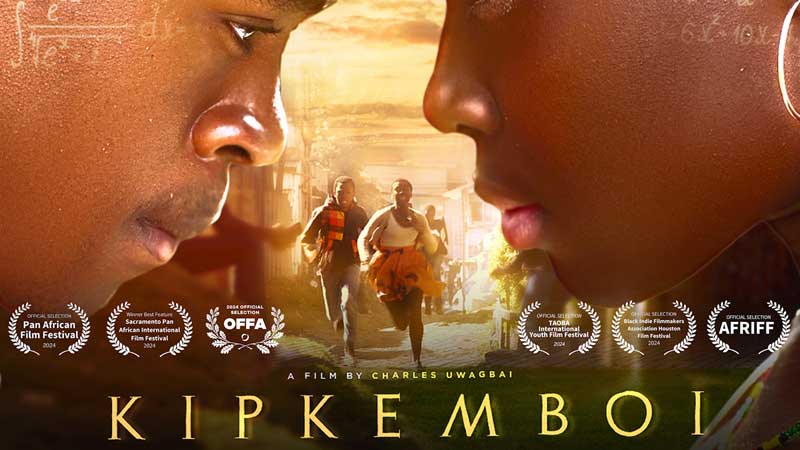🎥 2024 Oakville Film Festival. First Gala Screening. "Kipkemboi"
Sunday, 23 June 2024 11:10.AM
- Small town in Kenya. Math genius teenage brings the world financial markets to their knees by create his own equation to play the stock market. -
"Kipkemboi" brings together an exceptional Kenyan and Canadian cast and crew to create an aspirational and exciting story about two brilliant young Kenyans on an adventure to right the wrongs of the world in a unique feature film that showcases the beauty of Kenya.
This successful creative partnership celebrates Kenyan and Canadian talent encouraging future collaborations between these two great nations and peoples. A key mission of "Kipkemboi" is to represent Kenya in an authentic and realistic manner. The film is a fictional story that is grounded in reality - a boy with an extraordinary mind, and unwavering heart, fated to lead the Kenyan community he loves dearly.
The film stars Thamela Mpumlwana, Elsie Abang, David Cubitt, Abel Mutua, Chichi Seii and Vinessa Antione.
Excellent performance by the actors, who got used to the roles as if they themselves were born and raised in a small Kenyan village, and are familiar first-hand with the life of its inhabitants and neighboring regions.
In real life, Tamela Mpumlwan as Kipkemboi is a young talented actor from Toronto who has played significant roles in various television series (CBC, CT, CTV, PBS), Elsie Abang as Chepchirchir, a model and creator originally from Toronto, is currently receiving in Juris Doctor from UBC's Peter A. Allard School of Law and now lives in Vancouver, British Columbia.
Incredibly beautiful sound of Kenyan nature, excellent musical accompaniment, masterful video shooting - all this immerses viewers in the atmosphere of a distant African country, which is rapidly developing and raising the well-being of its people.
It’s a pity that the screen and acoustics of the somewhat outdated, cozy Oakville Center movie theater do not reproduce a diverse palette of colors and sounds that would allow the viewer to truly feel their presence in the country where the film takes place. But even despite this, the film simply cannot leave the viewer indifferent.
Perhaps, for many who were born and raised in Canada, one of the richest countries in the world, the problems of a small town in Kenya, where there are no computers, no Internet, not to mention a financial exchange, seem distant and almost unreal.
It is also difficult for younger generations of Canadians to understand that before the advent of mobile phones, people communicated remotely using landline phones or pay phones, before the advent of televisions there were only photographs and most were black and white, houses were heated with wood rather than centrally, and small farm plots with over time they turned into huge agro-industrial farms with their own exchanges. Ask any of them if they imagine their life without computers, robots and artificial intelligence, without fast food and fully prepared food with incredibly fast home delivery, without cozy world-class cars, comfortable yachts and airplanes that allow you to travel around the world without hindrance and affordable to the general public. Do they think about the fact that they do not live in miserable straw tents with a fire as a means of heating, but in cozy brick or concrete houses, and do not swelter from the heat, cooled by air conditioning or swimming in comfortable private or public pools, unlike residents of distant African settlements forced to hide from the scorching sun in the shade of trees or in their humble shacks.
Another thing is that Canada is a country of immigrants who come from different parts of the world. A film like “Kipkemboi” will be understandable to those who are familiar first-hand with the simple life of residents of not the richest regions of the world. These people, having themselves gone through many obstacles, will understand the desire of the talented boy Kipkemboi from the outback of Kenya to make his compatriots richer and bring their far from prosperous existence closer to the standard of living of people from richer countries.
The “Kipkemboi” undoubtedly deserves to receive high marks from the audience and the festival jury, as well as to be shown in the best cinemas in the world.
About “Kipkemboi”
Kipkemboi, a math genius from childhood, must pass up a MIT scholarship and provide for his family when his father dies. As he struggles with his dreams slipping away, Kipkemboi's girlfriend, Chepchirchir, gives him a used book from the local market that changes his life; Quants: How Mathematicians took over Wall Street. Inspired, he develops an algorithm to play the stock market. Drawing from his life on the farm, watching the wind, water and weather affect the birds and livestock, Kip has an insight into predicting patterns in the stock market.
Trading from a cobbled-together computer, powered by a car battery and broadcasting from a mud hut, his algorithm turns out to be an astronomical success generating millions of dollars.
Massive profits falling into an unknown village, Metipso, Kenya, attracts the attention of unsavoury international financiers, local police and the elders of his own village. When they all collide at Kipkemboi’s mud hut, the resulting clash forces Kipkemboi and Chipchirchir to run for their lives. Surviving by their wits alone, they are chased across the African countryside.
With his life in jeopardy and jail almost a certainty, one question remains, how could a farm boy bring down the global financial system and how far is the international world order willing to go to silence his story?
- Related materials:
